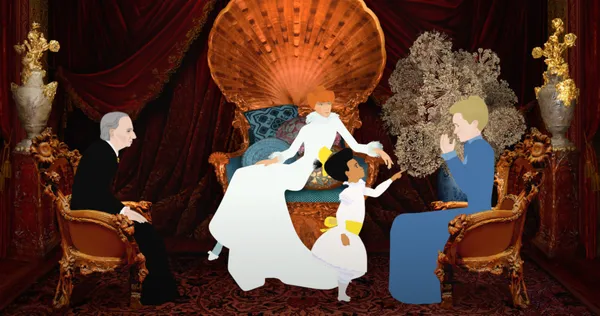Eye For Film >> Movies >> Dilili In Paris (2018) Film Review
Dilili In Paris
Reviewed by: Jennie Kermode

Paris, la Belle Époque. A city teeming with talent in virtually every field - yet a city that is still home (as, indeed, it is still home) to some very backwards thinking. In the opening scene we see our heroine, little Dilili (voiced by Prunelle Charles-Ambron), wandering round a collection of huts, surrounded by black people. We pull back to find a crowd of white people watching them in what resembles a zoo. Dilili, however, is not a prisoner like the tragic Ota Benga. Rather, she's a young adventuress as interested in observing Paris as its inhabitants are in observing her, and when local delivery boy Orel (Enzo Ratsito) decides that he wants to learn more about her, she seizes the opportunity to go on a tour of the city.
Michel Ocelot's combination of live film, photo-realistic images and animation brings out the magic of Paris as if were being seen for the first time, and combination of wonder and amusement with which Dilili beholds means that one could easily enjoy watching this tour for two hours even if nothing else happened. There is much, much more, however, because whilst the tour is underway Dilili learns that somebody is kidnapping the young girls of the city. Indeed, we soon become aware that she is being stalked herself. Together, she and Orel become determined to solve the mystery. In the process, they meet practically all the famous artists, writes, scientists and celebrities of the era, riding a white swan with Emma Calvé and engaging in a spot of stunt driving with Toulouse Lautrec. Ocelot pays particular attention to the female ones, showing how even those thought of as light entertainers wielded considerable social influence. In this environment, Dilili is perhaps one of the first girls to look at her own future with role models available to persuade her that she can do whatever she wants.

She wants a lot. Forthright and uncompromising (though exceedingly well mannered), she would be a striking figure in any age. She's mixed race and explains to Orel that the Kanak people among whom she grew up thought of her as too pale, just as Parisians think of her as too dark, but this sense of not fitting in seems to have inspired her to live entirely on her own terms. Ocelot uses her perspective to make gentle jokes about the appearance of white people (which stand out because this is so rare in cinema) and to make a series of points about how individuals engage with what they see as exotic, in both positive and negative ways.
There's an explicit feminist tone to this film and viewers might interpret some of the later scenes as critical of Islamic traditions, a sensitive issue in France at present, though they can also be understood more broadly. Issues around the internalisation of misogyny and related shame are dealt with sympathetically but firmly. All the themes and ideas here are presented in a way that's accessible for young viewers, though there's plenty for adults to enjoy, especially in regard to the film's treatment of its historical subjects.
Ocelot's animation is delightful as ever. Some scenes are a riot of colour, some sparkle in a way Disney's animators could only dream of, and there is occasional use of the silhouette work that marked out films like Tales Of The Night and Ivan Tsarevitch And The Changing Princess. Dilili's very direct gaze will not easily be forgotten, though for all her spirit we are not allowed to forget that she's a child, with a child's anxieties. In a film full of remarkable people she's a reminder that even the smallest among us can make a difference, and a fantastic heroine in her own right.
Reviewed on: 08 Oct 2019
















